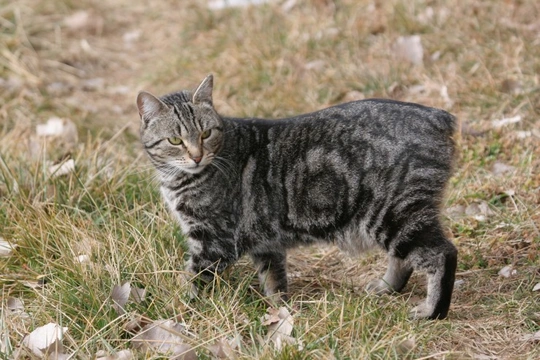
Manx Syndrome
Manx syndrome is a term that describes several conditions that affect the Manx cat all of which are related to the breeds physical characteristic, namely a short stumpy tail or no tail at all. The fact that Manx cats don't have tails is a direct result of a gene mutation, but sadly this can lead to other more serious abnormalities in the breed. These abnormalities affect a cat's spinal cord which in turn can result in cats developing neurological disorders with one of the most common problems being spina bifida.
Symptoms to Watch Out For
A cat suffering from the condition would typically show specific signs of there being something wrong although this does depend on the severity of their condition and how badly affected their spinal cord happens to be. Some of the symptoms associated with the Manx Syndrome include the following:
- Vertebrae are missing
- Vertebrae are fused
- Spina bifida
- A malformed sacral bone
- A malformed pelvic bone
- A strange hopping gait
- Cats tend to place more of their back legs on the ground than usual
- Hind leg paralysis
- Incontinence - cats cannot control their bowels or bladders which causes sores and inflammation around their back-ends
- Constipation
- A lack of feeling in back legs which prevents cats from being able to do many things
- A lack of feeling around the anus
Fortunately, Manx Syndrome is less commonly seen which is partly due to breeders waiting until kittens are around four months old before they sell them which is the only way of ensuring they are free of the disorder.
Diagnosing the Problem
A vet would need to have a cat's full medical history and ideally known their ancestry too. They would carry out a full physical examination of the cat and could recommend doing the following tests:
- X-rays
- A myelography
- An MRI scan
A cat could be born with quite severe symptoms, or the signs of there being something wrong could start to show a few months down the line, but once the symptoms manifest themselves, the condition would affect a cat for the remainder of their lives.
Treatment Options
Sadly, there is no treatment for cats with the condition although in some cases, a vet might recommend surgery, but the prognosis is always guarded as to how successful this would be.
The Genetics Behind the Condition
The mutant gene responsible for the fact Manx cats are tailless is known as M"". All Manx cats have one mutant M gene as well as one normal ""m"" gene. However, the M gene is the dominant one and if a cat should have two of the mutant genes in their makeup, they typically die early in their foetal development.
Knowing a Cat is a Carrier
It is important to know if a cat is a ""carrier"" or if they are likely to be affected by the condition and the only way of doing this is for breeders to identify all cats that could be affected. Kittens should be thoroughly examined by a qualified vet before they are sold. The trouble is that all Manx cats carry the mutant M gene and therefore they can produce kittens with the condition. For the moment, there is no way of eliminating the problem from the breed which in short means that a percentage of Manx cats could well be affected by the disorder.
""



